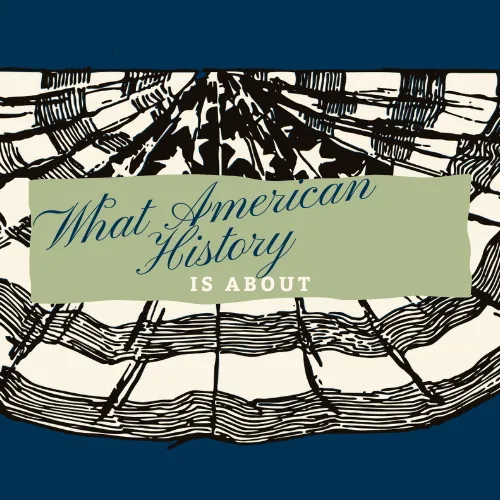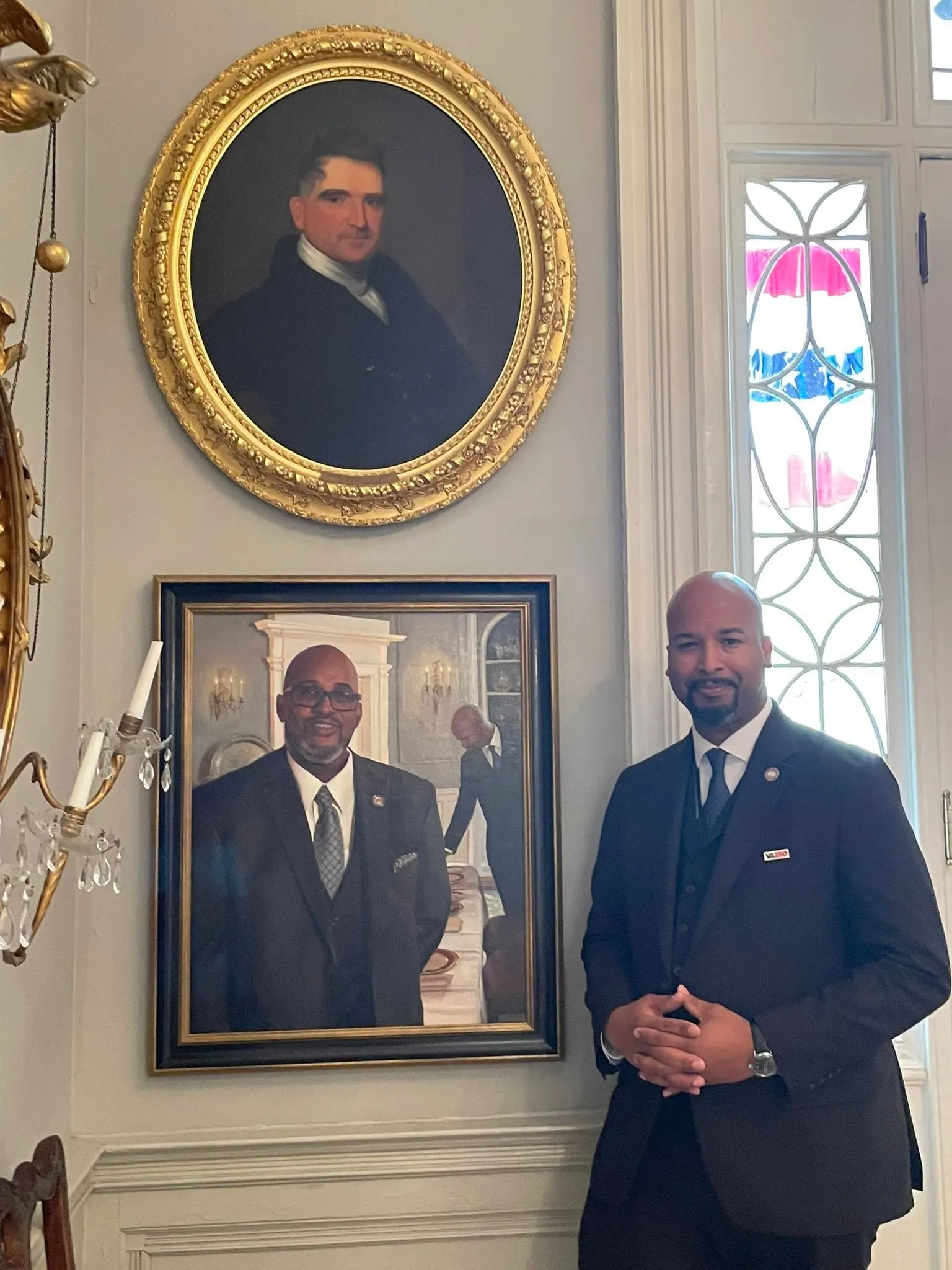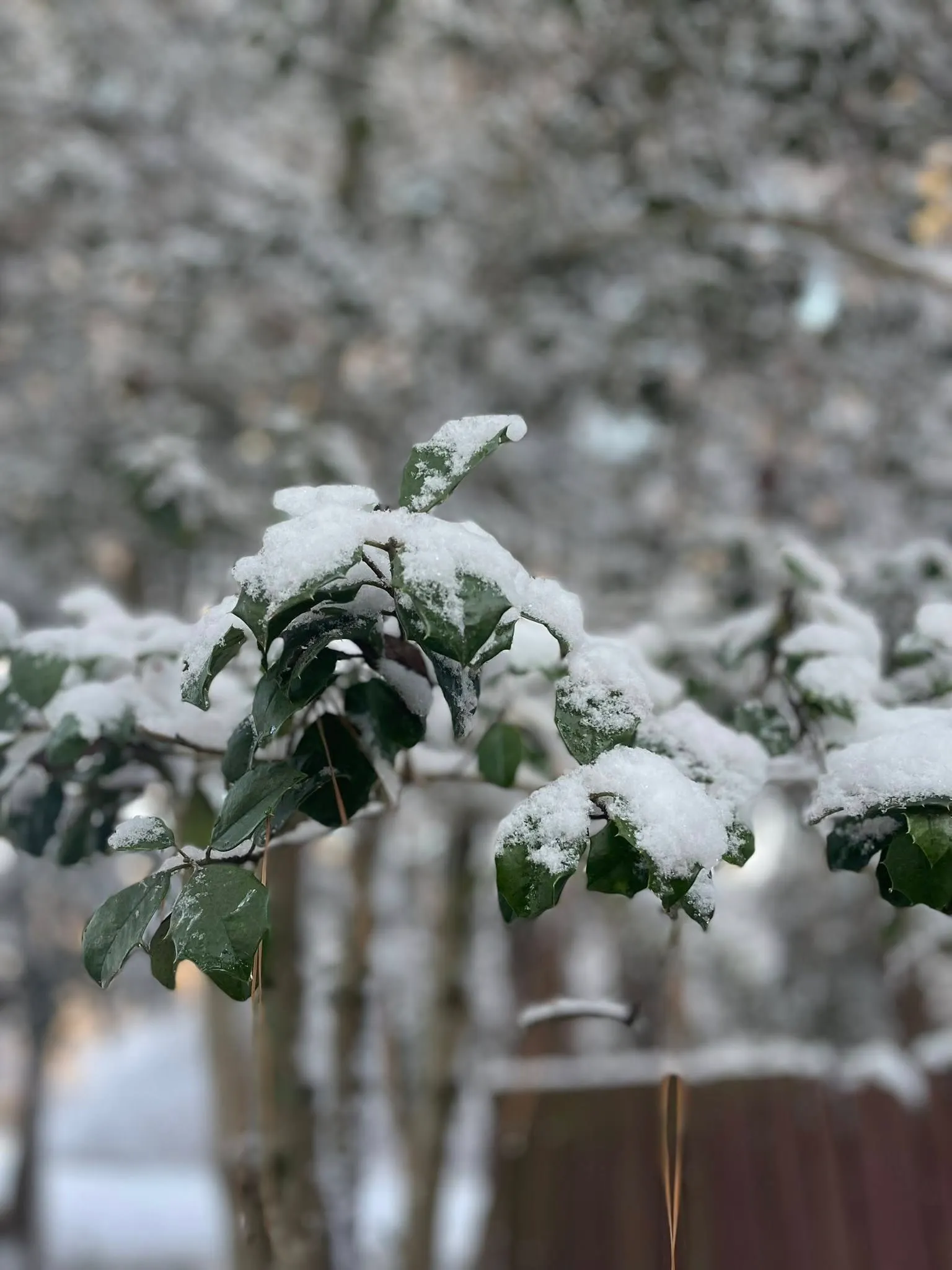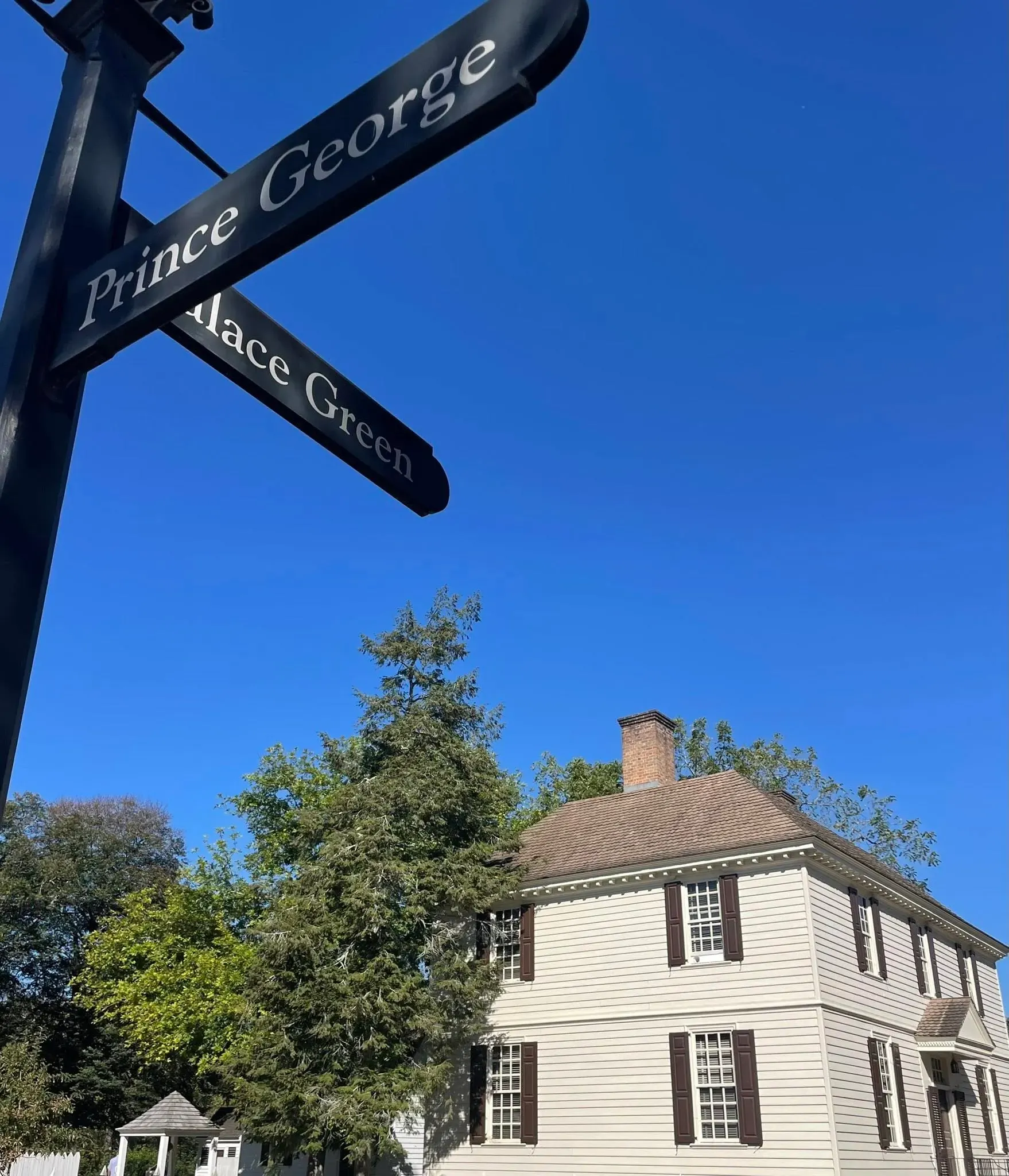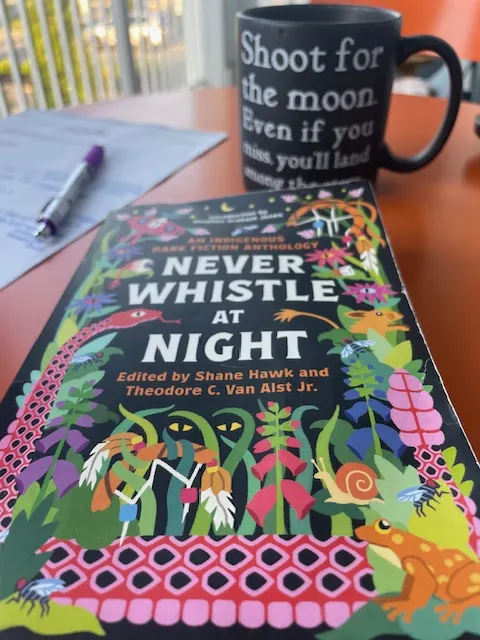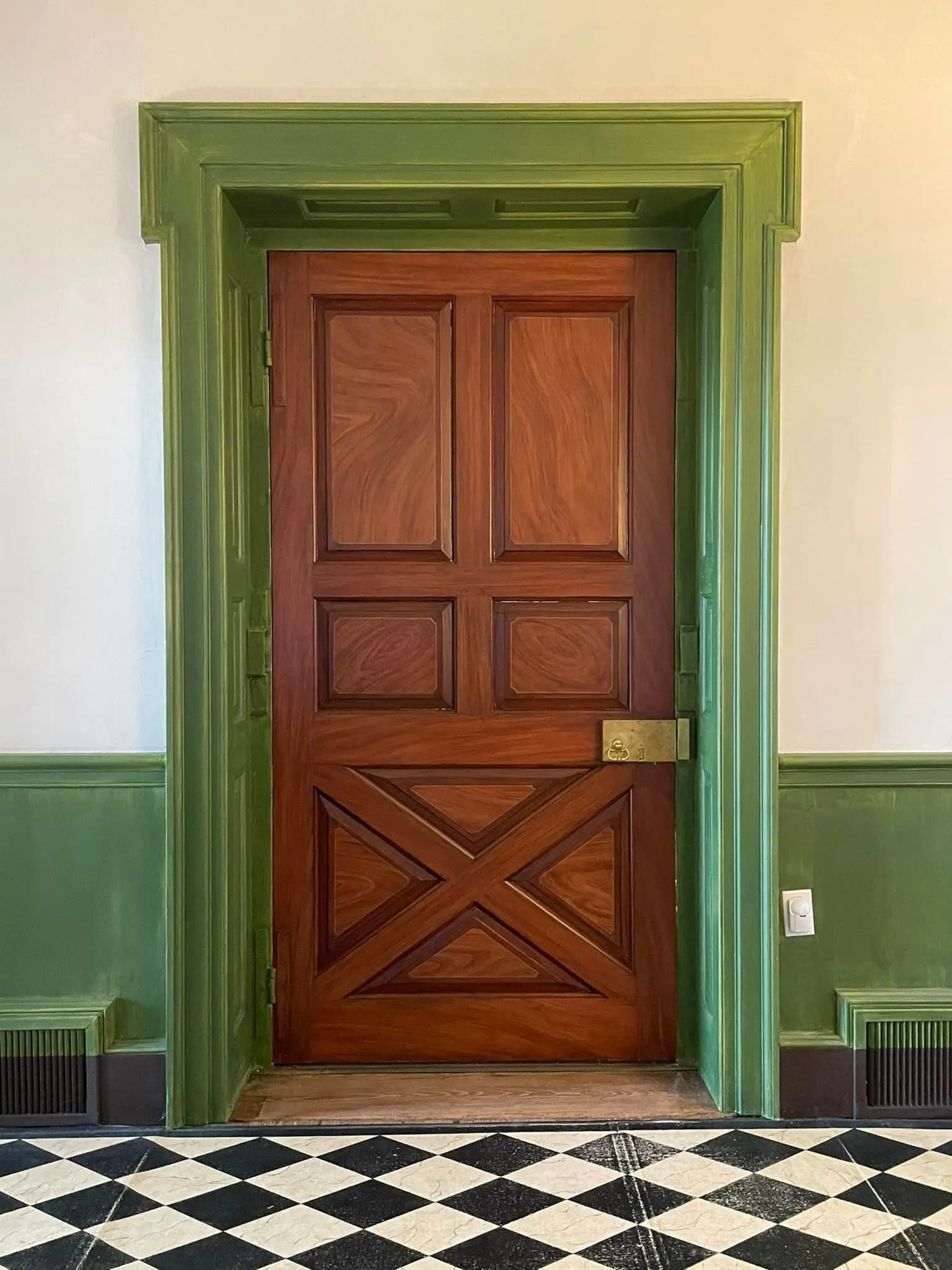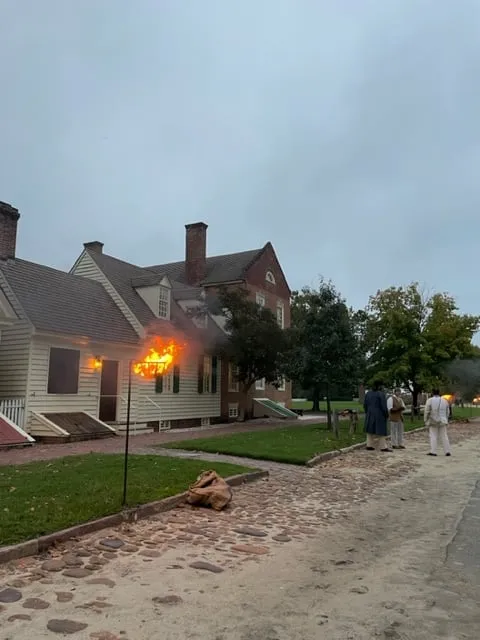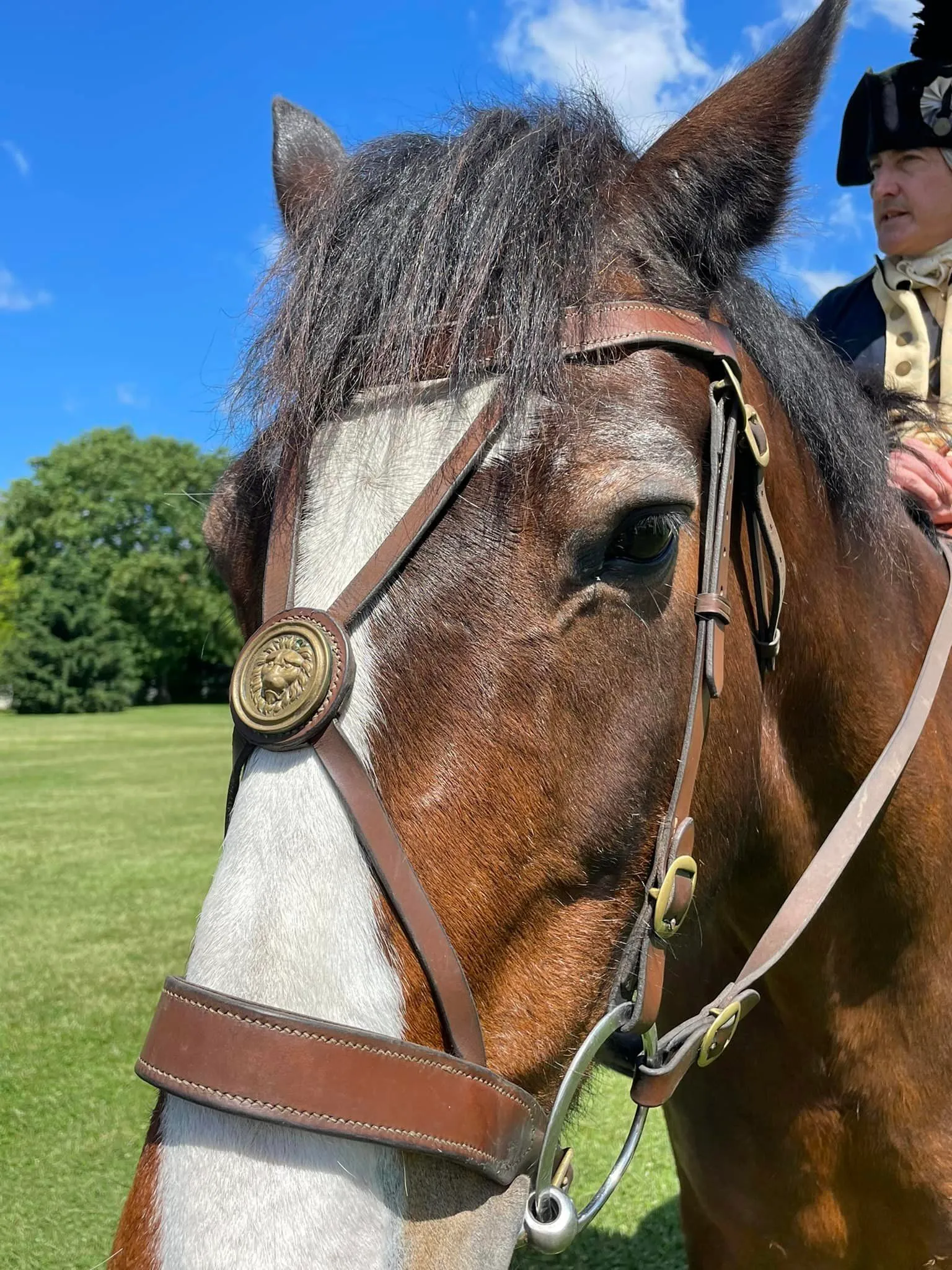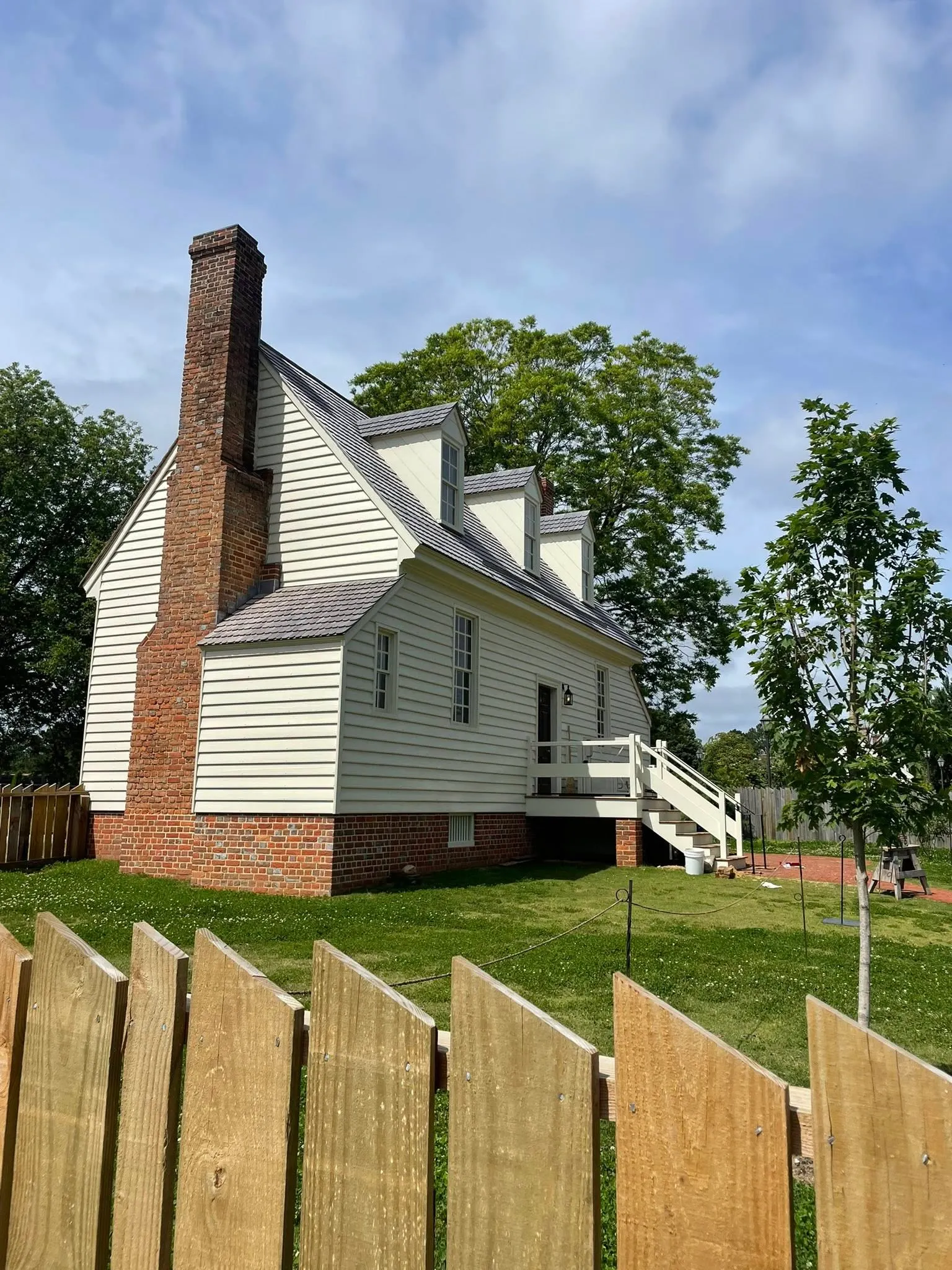The Final Breakfast: An End to Dunmore and Washington
My favorite words from an historian.
"New research" are literally my favorite words to come out of an historian's mouth and I was THRILLED to hear them from Daniel Cross.
Yesterday we got to see Daniel in his role of over 6 years, Colonel Washington. He's wealth of knowledge and a major asset to the Colonial Williamsburg (CW) department of Nation Builders.
It's always a privilege to partake in the special programming with a Nation Builder at the St. George Tucker House where we not only meet the man or woman from 18th century history, but the man or woman who brings that person to life.
One aspect of yesterday's program was the discussion about Colonel Washington's relationship with Lord Dunmore, Virginia's last Royal Governor (ok, I asked the question - because relationships in history fascinate me!).
Daniel shared with us that according to new research, he's able to interpret the relationship may be different than what we believed it to be. It's often discussed around here they were great friends. However, it could've been a little more political (professional?) than that.
One thing I learned: that Lord Dunmore and then-Colonel Washington, sharing the love of the outdoors and a military background, had breakfast together the day Virginia's House of Burgesses was dissolved suddenly.
And through Daniel's research, it seems likely Washington was taken by surprise... and may have felt betrayed by Dunmore.
There's no indication of any further breakfasts (or other meals for that matter) between the two men.
RELATED: Read about Daniel Cross here.
Disclaimer: As a blogger, I use affiliate links sometimes! I may receive commission from purchases I share; it does not change your price but sometimes you might get a discount.
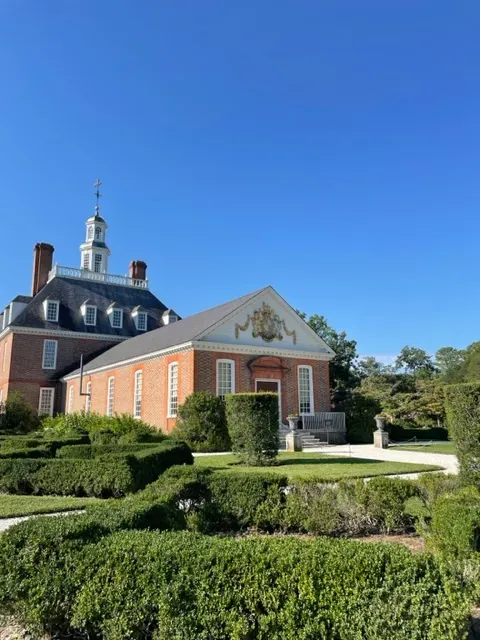
Rear view, reconstructed Governor's Palace.
Meet the men.
Colonel George Washington.
After the 7 Years War, Colonel Washington retired to life at Mt. Vernon. Farming was clearly his passion. However, with the military experience he had, he was consulted as an advisor in the following years.
As the 1770's hit, Colonel Washington, serving in the Virginia House of Burgesses, had developed a relationship with an unpopular guy- Lord Dunmore.
Keep in mind a few things about the George Washington of 1774:
- He was a loyal Brit, who served in the King's army against the French in the Seven Years War (aka the French and Indian War)
- He'd been married to the Widow Custis, now Martha Dandridge Custis Washington, for about 15 years.
- Although serving in the House of Burgesses, he was an experimental farmer exploring innovative methods and out of the tobacco business since the 60's.
- Washington was not a member of the aristocracy so to speak; he was a third son who inherited Mt. Vernon after his brothers' deaths and married well into one of the most prominent and wealthy families- but all indications show me it was a marriage built on love.
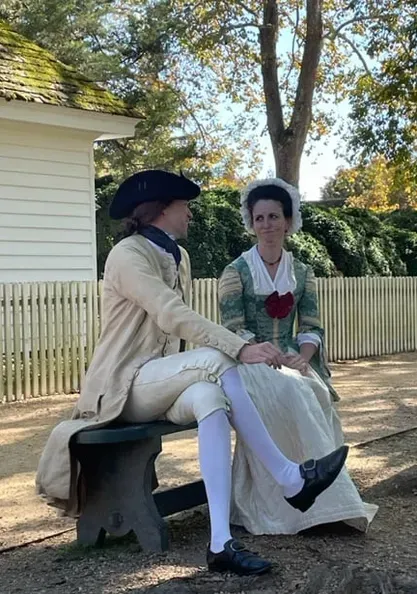
Daniel Cross & Katharine Pittman portraying the Washingtons.
Lord Dunmore, Virginia's last Royal Governor.
John Murray, the 4th Earl of Dunmore, was doing well in New York. And then the King sent him off to Virginia- where his role as Royal Governor during the most turbulent of times led him to flee out a back door of the Governor's residence in the middle of the night. Side note: This is something you can learn more about visiting CW because it's discussed on the Palace tour!
As the so-termed Revolution took hold in Virginia, Lord Dunmore was already unpopular amongst Virginians. By June of 1775 he had to get his family out of Williamsburg and run government (from his perspective of being in charge!) from a boat on the York River before leaving Virginia permanently.
A few notes about Lord Dunmore:
- He was a Scottish nobleman whose wife Charlotte was known to be well-loved both by her friend the Queen of England and the colonists in Virginia.
- He had been imprisoned in the Tower of London in the late 1740s, a result of the Jacobite Army defeat in 1746 and his father's role supporting the "Bonnie Prince Charlie."
- In what was seemingly an attempt to win favor, the Murrays named their daughter Virginia. She was born during his tenure as Royal Governor.
Clearly, there is much more to the man, but I wanted to give you some context to the man in terms of his presence here in the Colonies.
RELATED: This article from the American Battlefield Trust about the last Royal Governors of America and if you want to dive deeper into the life of Dunmore, click here.
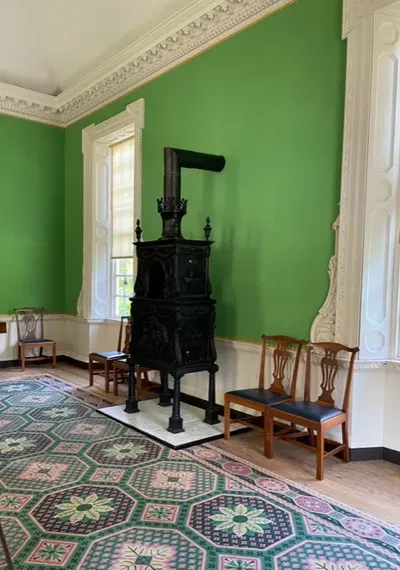
Reconstruction of the room Dunmore would've fled out of into the darkness.
The significance of one specific breakfast in May of 1774.
The friendship.
It's often shared around here in CW that Washington and Dunmore had a "friendship." As I learn more from Daniel, 100% benefitting from his research, that might not be based on what I define as "friendship."
- Both men were interested in land speculation (or just plain ownership).
- Both men loved outdoor sports and went on expeditions together, as documented in letters (and you know by now I love primary sources, especially letters!).
- Both men were military veterans of the same time frame and were about the same age.
But were commonalities more about convenience or a true friendship?
That may be up for debate and interpretation. Regardless, they had a relationship. And that relationship doesn't seem to be evident beyond a specific breakfast in May of 1774.
Dissolution.
Yes, it was the role of the Royal Governor to dissolve government; a typical action at the end of a legislative session... however in May of 1774, it happened suddenly.
You likely heard about the destruction of private property that took place in Boston. It goes down in history as the Tea Party. It was the act of several individuals- but English Parliament reacted by closing the port of Boston - impacting all of the Massachusetts Bay Colony.
No doubt, Virginia's House of Burgesses felt a bit prickly. Even fearful; if the King (his government) could punish an entire colony for the acts of a few, couldn't something similar happen here?
Establishing a day of prayer, which at the time would need to be done by the Royal Governor, not the legislative body itself, seems a clear predecessor - even a catalyst - to Dunmore's action.
The action: dissolving the House of Burgesses, whose Speaker was Peyton Randolph.
The response by Virginia's elected officials? Meet in the Apollo Room of the Raleigh Tavern and operate outside the established and recognized government. You can read more here about the Raleigh Tavern and it's role during this time period.
What did Dunmore do? Start a war of course- with the Shawnee. And Washington did not join him in the field. He took off and left his wife and children for several months after upsetting the apple cart of Virginia government. Read more here.
Author's note: the narrative above is based on learnings over time from tours and interpreters throughout CW as well as various primary sources and supplemental reading. It's my summary. See disclosure at the end of the post.
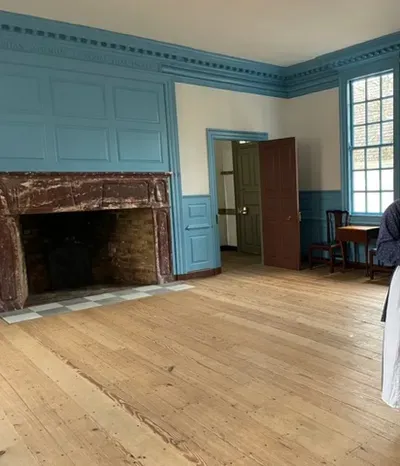
Apollo Room reconstruction, Raleigh Tavern.
Learning the details of May 1774.
Ok, I know not all of you will be able to visit CW, but if you can, taking a tour of the Capitol Building, as well as the Raleigh Tavern, and the Governor's Palace will all give details you can weave together into the story of our Revolution.
This spring, as I write this, a new street theater program happens several days a week outside the Raleigh. The focus: the dissolution and resulting actions taken at the Raleigh- and OMG it's FANTASTIC.
Yes, there are stories in every former colony (please share them with me!) but you mostly see Virginia on this blog because 1) I live here and 2) as my friend Karen at the St. George Tucker House referenced, we are "ground zero."
Read more here about the original colonies and putting this blog overall into context for early American history.
The final breakfast in context.
On the morning of "dissolution day" aka May 26, 1774, following breakfast with Colonel Washington, Lord Dunmore dissolved the House of Burgesses.
Washington would join his fellow Virginians in plans toward reconciliation and, ultimately, a move to independence from England. More snippets of early American history are to be told about Dunmore's escape, his proclamation and even the plan to kidnap Washington's wife.
But for all intents and purposes, I'm calling this the end of a friendship between the two men.
Stay tuned!
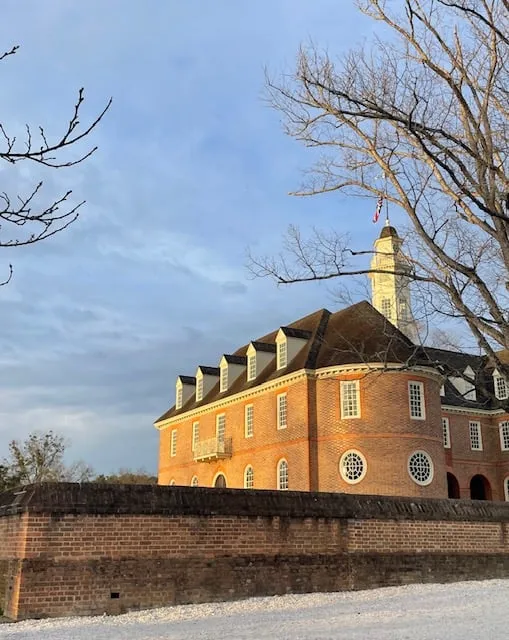
Capitol reconstruction, CW.
What would Dunmore and Washington have eaten?
You didn't think this was a "food" post did you? Well as always, one bit of history leads to more history!
In this case, after hearing about this likely "final" breakfast between two men who shaped the future of America through their thoughts and actions, I had to know what they ate.
While the specific menu may not be known (at least to me!), I got it on good authority what was a reasonable assumption from our historic foodways team working at the Palace Kitchen in CW, if they'd eaten at the Palace. As it was, they ate at Dunmore's plantation: Porto Bello.
At the Palace, where both men dined together with their wives the day prior, the main meal was dinner. There, and in general, it was served around 2pm. The cooks would've spent the morning preparing it. Supper was in the evening and consisted of leftovers from dinner.
So what was breakfast at the Palace? Leftovers from the leftovers according to our historians and cooks at CW.
This means: likely food that was able to survive overnight including cakes- for breakfast! Not far off our sugary pastries right? Also common: bread. So knowing all of this, I had to run over to the kitchen and ask if leftover leftovers is what Lord Dunmore would've served a special guest like the Colonel and the answer was yes.
Our cooks indicated that quite possibly a nice jam was added or even quickly made muffins. We'd call them "English muffins" today but to the English in the 18th century: just muffins.
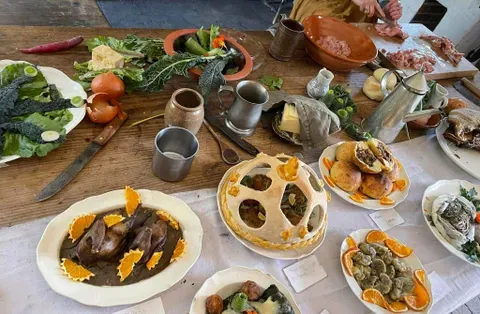
Typical Palace dinner course, CW Historic Foodways.
Closing words from history.
Back to Dunmore and his relationship with Washington. Here, an excerpt of Washington sharing his schedule with Dunmore to plan an expedition west together. In context, he is planning to take Martha's son Jack to New York for college.
Read the letter in full, with citations, by clicking here.
From George Washington to Lord Dunmore, 13 April 1773
To Lord Dunmore
Mount Vernon 13th of Apl 1773
My Lord
In obedience to your Lordship’s request, I do myself the honour to inform you that, by Letters this day receivd from Doctr Cooper of Kings College in New-York, I find it will be about the first of May before I shall set of for that place; and that it will be June, perhaps the middle of it before I return1— Harvest then coming on, and seldom ending till after the middle of July I could almost wish to see it accomplish’d; but if the delay in doing of it, is attended with any kind of inconvenience to your Lordship, I will, at all events, be ready by the first of July to accompany you through any, and every part of the Western Country you may think proper to visit.
Are you enjoying the blog? Use my online tip jar and buy me a coffee:
There is a huge practical disclaimer to the content on this blog, which is my way of sharing my excitement and basically journaling online.
1) I am not a historian nor an expert. I will let you know I’m relaying the information as I understand and interpret it. The employees of Colonial Williamsburg base their presentations, work, and responses on historical documents and mainly primary sources.
2) I will update for accuracy as history is constant learning. If you have a question about accuracy, please ask me! I will get the answer from the best source I can find.
3) Photo credit to me, Daphne Reznik, for all photos in this post, unless otherwise credited! All photos are personal photos taken in public access locations or with specific permission.
